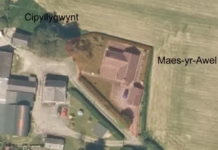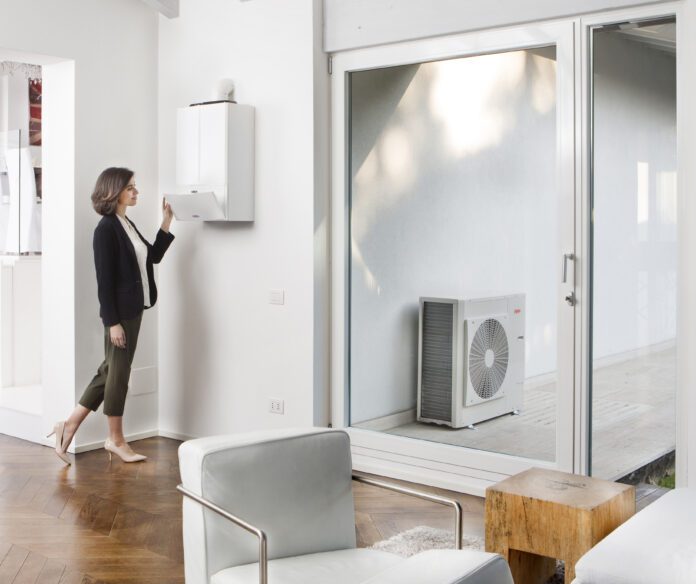Top tips and considerations for installing a heat pump, and complying with all-important planning regulations
With the UK Government’s target to install 600,000 air source heat pumps each year by 2028, and grants available to homeowners who install green technology, the popularity of this new low-carbon form of heating is increasing.
At the same time, only half (54%) of UK homeowners are aware of heat pumps according to a recent study, and many aren’t clear of their options when it comes to incorporating green tech into their heating and hot water system, as well as the many regulations that surround this thus far fairly unknown piece of equipment.
Daniel Wilden, renewable product manager for heating expert, Alpha, answers the most common questions around installing an air source heat pump in your home, and the all-important factors to think about to ensure your new heat pump meets planning regulations.
What is an Air Source Heat Pump, and will it replace my gas boiler?
More and more homeowners are becoming aware of the upcoming changes to home heating, with the abolition of new gas boilers by 2035. Many though are not sure what this means for them, and whether they need to start thinking now about installing greener technology in their home.
Many believe that it’s an ‘either-or’ choice between heat pump or boiler, however with a hybrid approach, households can tap into the best of both technologies, while also making the most of low-carbon electricity. Heat pumps can also work alongside an oil- or LPG-boiler for homes that are off the gas grid.
The most common heat pump found in UK homes today is the air-to-water type. This has an outdoor unit (approx. 1m(w) x 1m(h) x 330m(d)) that collects heat from the outdoor air and raises the temperature to heat water for your radiators or underfloor heating. The heat pump can also provide hot water to a cylinder in your home for use in showers and hot taps.
A heat pump is an energy-efficient way to deliver heating and hot water to a home as, on average, it uses 1 kilowatt of electricity to produce approximately 3 kilowatts of heat (dependent on the size of the system and outdoor temperatures).
Is it expensive to install a heat pump and will it save me money in the long-run?
The benefit with installing an air source heat pump is the incredible long-term cost savings these will have on your monthly outgoings, especially as the cost of gas continues to sky-rocket and the cost-of-living affects the majority of UK households.
As a new and quite specialist technology, the cost of the heat pump unit and associated labour costs is a significant investment – when compared to a standard combi boiler replacement for example – however being a low-carbon energy technology, the running costs are significantly lower.
The UK Government is also offering grant funding on air source heat pumps at the moment, which sees homeowners receive £5,000 towards the cost of a heat pump, and a zero rate of VAT for installing clean heating measures.
Do I need planning permission to install an air source heat pump on my property?
It’s important when planning to install a heat pump that you’re aware of the necessary planning regulations that apply to your property.
Air source heat pumps do fall under the ‘permitted development’ regulations, which is the term used for modifications to your property that do not require formal planning permission to be submitted to your local council – a common one is a small single-storey extension or outbuilding.
However, for a heat pump to comply with permitted development terms, there are several aspects that must be met, otherwise full planning permission is required. Should you need to go down the planning permission route, the council will consult your neighbours to check they are happy that you install a heat pump on the outside of your property. If a neighbour were to complain about the heat pump unit, and you didn’t have the correct planning in place, the council would be within their rights to remove it.
Permitted Development terms include:
- Noise – a noise calculation must be done before the heat pump is installed to ensure limited impact on your neighbours. The calculation, which should be completed by your installer, looks at sound power level of the pump, any reflective surfaces (such as the wall or floor), its position distance from your neighbours’ closest habitable rooms, as well as if there are any barriers (e.g. fencing) standing between the unit and your neighbour
- Size – a heat pump cannot be larger than 0.6 cubic metres (although most standard size units do not exceed this)
- Location – the heat pump must be sited one metre or more away from your property’s boundary. If installed on a flat roof, it must be one metre or more from the edge
- Your property – permitted development does not apply on any listed properties, or those situated in conservation areas
- First pump only – permitted development is only granted on the first heat pump (or wind turbine) on your premises
Who should install my air source heat pump?
The Microgeneration Certification Scheme (MCS) accredits contractors that are able to meet the planning standards surrounding the installation of low-carbon energy technologies.
It’s vital that when having a heat pump installed, you opt for an MCS-certified contractor. As well as having unrivalled knowledge and training on the rules and requirements around air source heat pumps, they are obliged to take legal responsibility should anything go wrong.
They are experienced in both the design and installation of a heat pump and will be able to advise on the best location for your heat pump, enabling you to operate under permitted development (where achievable).
In addition, a homeowner must use an MCS-certified installer to be able to claim the £5,000 grant funding from the Government – so making sure your installer has the right accreditations really is a no brainer.
For further information about Alpha and its range of low-carbon energy heating technologies, visit alpha-innovation.co.uk.

| [donate]
| Help keep news FREE for our readersSupporting your local community newspaper/online news outlet is crucial now more than ever. If you believe in independent journalism,then consider making a valuable contribution by making a one-time or monthly donation. We operate in rural areas where providing unbiased news can be challenging. |






















